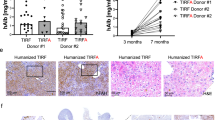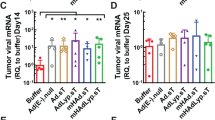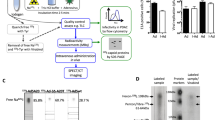Abstract
Direct administration of an adenoviral vector expressing the cytosine deaminase gene (AdCMV.CD) to tumors of colon carcinoma cells, with concomitant systemic administration of 5-fluorocytosine (5FC), results in local production of 5-fluorouracil (5FU) and suppression of tumor growth. Based on the demonstration that in vivo adenovirus-mediated gene transfer to intrahepatic tumors is relatively inefficient compared with in vivo gene transfer to hepatocytes, we developed a ‘regional’ prodrug strategy using in vivo Ad-mediated CD gene transfer to normal liver, permitting hepatocytes to convert 5FC into 5FU to treat local metastasis effectively in a ‘trans’ fashion. To show that hepatocytes can generate and export sufficient 5FU to achieve this goal, primary rat hepatocytes were exposed to AdCMV.CD and 5FC. Evaluation of the supernatants by spectrophotometry and by HPLC demonstrated significant conversion of 5FC into 5FU. When supernatants of hepato- cytes exposed to AdCMV.CD and 5FC were transferred to cultures of CT26 mouse colon carcinoma cells, the CT26 viability was reduced by 80%. To show that this regional AdCMV.CD/5FC prodrug strategy can suppress tumor growth in vivo, a model of metastatic colon carcinoma was established by injecting CT26 cells into the left lobe of the liver of syngeneic Balb/c mice. The next day, AdCMV.CD was transferred to hepatocytes by intravenous administration, and 5FC treatment was started the following day. Evaluation of tumor growth after 15 days showed marked suppression of tumor growth in AdCMV.CD- and 5FC-treated animals compared to control groups (P < 0.007). we conclude that primary hepatocytes are capable of converting 5fc into 5fu and exporting sufficient amounts of 5fu to the local milieu to suppress the growth of liver metastases of colon carcinoma cells.
This is a preview of subscription content, access via your institution
Access options
Subscribe to this journal
Receive 12 print issues and online access
$259.00 per year
only $21.58 per issue
Buy this article
- Purchase on Springer Link
- Instant access to full article PDF
Prices may be subject to local taxes which are calculated during checkout
Similar content being viewed by others
Author information
Authors and Affiliations
Rights and permissions
About this article
Cite this article
Topf, N., Worgall, S., Hackett, N. et al. Regional ‘pro-drug’ gene therapy: intravenous administration of an adenoviral vector expressing the E. coli cytosine deaminase gene and systemic administration of 5-fluorocytosine suppresses growth of hepatic metastasis of colon carcinoma. Gene Ther 5, 507–513 (1998). https://doi.org/10.1038/sj.gt.3300611
Received:
Accepted:
Published:
Issue Date:
DOI: https://doi.org/10.1038/sj.gt.3300611
Keywords
This article is cited by
-
Gene Therapy Strategies for Hepatocellular Carcinoma
Journal of Biomedical Science (2006)
-
Gene therapy of hepatocarcinoma: a long way from the concept to the therapeutical impact
Cancer Gene Therapy (2003)
-
The potential of 5-fluorocytosine/cytosine deaminase enzyme prodrug gene therapy in an intrahepatic colon cancer model
Gene Therapy (2002)
-
Prodrug and antedrug: Two diametrical approaches in designing safer drugs
Archives of Pharmacal Research (2002)
-
Positron emission tomography imaging for herpes virus infection: Implications for oncolytic viral treatments of cancer
Nature Medicine (2001)



